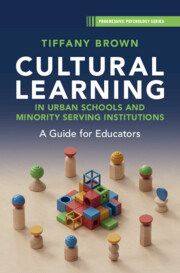Refine search
Actions for selected content:
3 results
Chapter 12 - Consequences of Variance in Use of Traditional and Culturally Responsive Classroom Management Strategies for Learning across Student–Teacher Differences in MSIs
-
- Book:
- Cultural Learning in Urban Schools and Minority Serving Institutions
- Published online:
- 20 March 2025
- Print publication:
- 03 April 2025, pp 172-186
-
- Chapter
- Export citation
Chapter 1 - An Action Science Approach to Cultural Learning in Urban Schools and Minority Serving Institutions (MSIs)
-
- Book:
- Cultural Learning in Urban Schools and Minority Serving Institutions
- Published online:
- 20 March 2025
- Print publication:
- 03 April 2025, pp 9-24
-
- Chapter
- Export citation

Cultural Learning in Urban Schools and Minority Serving Institutions
- A Guide for Educators
-
- Published online:
- 20 March 2025
- Print publication:
- 03 April 2025
